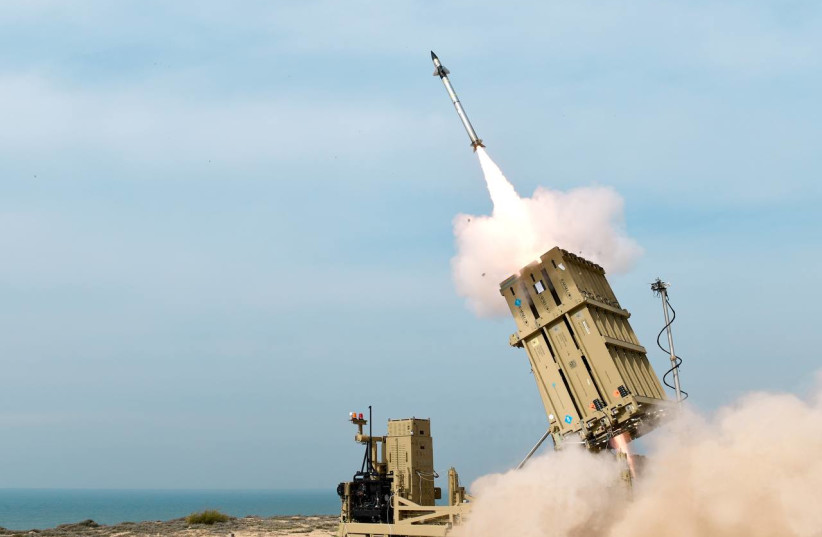The US has an Iron Dome system ready, US Army Space and Missile Defense Commanding General Lt.-Gen. Daniel Karbler told the Senate last week when asked whether Ukraine could use one.
Ukraine on Monday criticized Israel for sending high-ranking Foreign Ministry diplomats to Moscow. Jerusalem is “having business as usual with the Russian war criminals,” a Ukrainian senior diplomatic official said.
Last week, in a Senate Armed Services Subcommittee on Strategic Forces session about missile-defense issues, Sen. Angus King (Independent-Maine) asked why Iron Dome had not been deployed in Ukraine.
Developing the Iron Dome
“We helped pay for it,” he said. “We sent something like $3 billion to Israel to develop it… Wouldn’t this be a very important resource for the Ukrainians since their principal problem right now is missile defense?”
“We sent something like $3 billion to Israel to develop it… Wouldn’t this be a very important resource for the Ukrainians since their principal problem right now is missile defense?”
Angus King
The Iron Dome air- and missile-defense system was developed by Israeli defense company Rafael and commissioned by the Israeli government, which initially funded its development and the deployment of the first two systems. The US contributed $2.6b. to the Iron Dome project since its deployment in 2011, allowing for the production of additional systems and interception missiles. Rafael and US-based Raytheon co-produce components of intercepting missiles for the US, which has two Iron Dome systems.

In response to King’s query, Assistant Secretary of Defense for Space Policy John Plumb said the US was aiding Ukraine in its war effort with “things we can supply from our own stock,” such as Patriot missile batteries.
“We made a significant investment in missile defense and encourage our allies to do the same,” he said. “I am not aware of an Iron Dome system being offered to Ukraine.”
Karbler said the US has “two Iron Dome batteries right now. One completed new equipment training, new equipment fielding. It is prepared for deployment. The other one is wrapping up its new equipment training right now. So the army does have one [Iron Dome battery] available for deployment if we get a request.”
A spokesperson for the US Army Space and Missile Defense Command clarified that Karber was referring to the availability of the Iron Dome system for US military combatant commands, if requested, and not to Ukraine.
As the main producer of Iron Dome systems, Israel would have to grant permission for the US to send it to any other country.
Asked whether Karbler’s remarks indicated that Israel has allowed the Iron Dome to be sent to Ukraine, the Prime Minister’s Office declined to comment.
Israel has not provided Ukraine with defensive weapons, despite requests from Kyiv. Jerusalem has generally said it opposes Russia’s invasion of Ukraine, but it does not want to threaten its deconfliction mechanism with Moscow, which allows the IAF to strike Iranian targets near the northern border unimpeded by the Russian military, which maintains a presence in Syria. Israel has sent humanitarian aid and contributed and allowed the export of missile- and drone-attack warning systems to Ukraine.
The Iron Dome has been the subject of mixed messages from Ukraine. Last year, Ukrainian Ambassador to Israel Yevgen Korniychuk said: “We need Iron Dome... which will allow us to save our civilian women and children from the shelling of the Russian missiles in our territory.”
Ukrainian Defense Minister Oleksii Reznikov said: “Iron Dome does not protect against cruise and ballistic missiles.”
The Iron Dome defends mostly against short-range rockets and artillery shells. There are about 12 batteries in the world, including an estimated 10 in Israel – the Defense Ministry does not divulge the exact number – and two in the US.
The 10 in Israel do not actually cover the entire country and are sometimes moved to different locations that might be attacked. Ukraine is 11 times larger than Israel, meaning that one Iron Dome battery would protect very little of it.
Ukraine criticizes Israel for a high-level diplomatic meeting in Moscow
A Ukrainian senior diplomatic official on Monday sharply criticized Israel for a meeting on May 5 in Moscow attended by Foreign Ministry Deputy Director-General for Strategic Affairs Joshua Zarka, Deputy Director-General for Euro-Asia Simona Halperin and Russian Deputy Foreign Minister Sergei Ryabkov.
The sides primarily discussed the Iranian nuclear threat and diplomacy related to the currently defunct Iran nuclear deal, the Russian Foreign Ministry said. Jerusalem confirmed that the meeting took place but would not provide further details.
The Ukrainian senior diplomatic official said Kyiv was “deeply disappointed by the exchange of visits by the Israeli and Russian [Foreign Ministry] officials while Russia is butchering our citizens.”
“We are being attacked by terrorists that are steadily supported by the Russia-Iran alliance, and yet, Israeli officials keep having business as usual with the Russian war criminals,” the official said. “Israel has to decide if it is a part of the Western world and stands besides Ukraine or whether it embraces the world’s dark forces. Neutrality is not an option.”
“As a nation that is also attacked by terror funded by Iran, we expect Israel not to be the only Western country with strong ties with Russia,” the Ukrainian senior diplomatic official said.
The Foreign Ministry declined to respond to the Ukrainian remarks.
